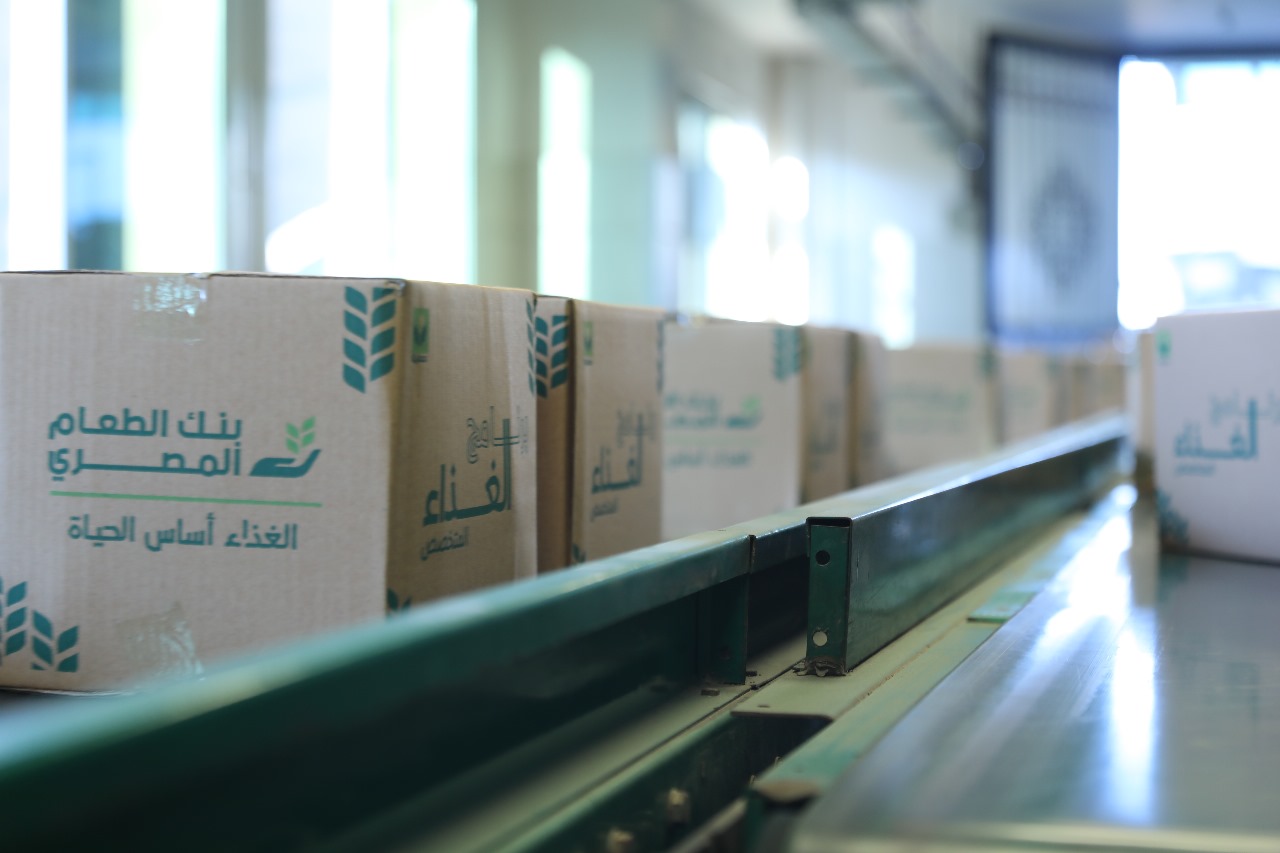Year-long Uninterrupted Philanthropic and Developmental Initiatives by the Egyptian Food Bank in 2023
Immediate Aid for Palestinians in Gaza and Support for Individuals Affected by Natural Disasters
Deployment of Millions of Meals and Food Boxes across all Governorates, Expanding Initiatives beyond Egypt’s Borders
Signing numerous cooperation protocols with various entities, playing a prominent role in food-related activities through the National Alliance for Civil Development Work
In 2023, the Egyptian Food Bank achieved significant milestones across multiple domains. It emerged as a leader in various events, activities, and situations that had a societal impact, both domestically and internationally. These accomplishments stemmed from the Egyptian Food Bank’s specific initiatives and its active engagement in the National Alliance for Civil Development Work.
Operating throughout the entirety of 2023, the Egyptian Food Bank demonstrated substantial efforts and a steadfast commitment to fulfilling its mission. This underscores substantial efforts and a steadfast commitment to fulfilling EFB’s mission in executing its food programs.
Achieving a significant segment of its strategy and objectives, the Egyptian Food Bank has been successful, anchored on three core goals. Firstly, it focuses on creating public value by intensifying efforts to aid underprivileged individuals, thereby generating tangible value for EFB’s initiatives. Secondly, community support and authorization is garnered through EFB’s engagement with the public through various channels, reinforcing its positive image and reputation. The third fundamental pillar is operational excellence, evidenced by the refinement of EFB’s operational systems to ensure deliberate and sustainable growth.
“The Egyptian Food Bank enhanced sustainable development initiatives based on the four main pillars through which it executes all its programs and activities: Protection, Prevention, Empowerment, and Elevation. We have also launched new programs and projects across various Egyptian governorates to address the issue of food and reach and empower those in need through various programs and initiatives, catering to different segments and levels of society.” Remarked Mohsen Sarhan, the CEO of the Egyptian Food Bank.
He added, “I am proud of what we have achieved in 2023, showcasing the Egyptian Food Bank’s ability to overcome numerous challenges. This success is attributed to the collective efforts of all the employees at the Egyptian Food Bank and their dedication to serving the deserving beneficiaries. The strong engagement of employees with EFB’s activities and programs is a fundamental element in our success. It reflects positively on the satisfaction levels of both beneficiaries and donors and aligns with the consistent steps taken by the Egyptian Food Bank towards the development of communities throughout Egypt. Our mission at the Egyptian Food Bank goes beyond the concept of providing direct food assistance to eligible families. Our role also encompasses achieving goals related to supporting food security and reducing malnutrition rates among children through a diverse range of evidence-based programs and measures. We are accompanied by scientifically rigorous impact measurement plans to assess the effectiveness and cost-efficiency of EFB’s programs in achieving the desired positive impact.”.
Throughout 2023, the Egyptian Food Bank implemented all its activities under the slogan “Food… A Basic Life Need”, in which its team collaborated with multiple community based organizations (CBO), totaling 3700 civil and solidarity associations servicing the community. Through the protection pillar, the Egyptian Food Bank distributed 1,167,164 food boxes and 2,390,792 meals. This was achieved through several programs and activities, including the Tekya program, to prepare and distribute daily hot meals to the neediest groups through equipped kitchens across various governorates in Egypt, and portable convoys program in different governorates, particularly the border governorates.
The Egyptian Food Bank’s endeavors has also expanded regionally. Regarding the situation in the Gaza Strip and the challenges our Palestinian brothers and sisters are encountering, the Egyptian Food Bank, in collaboration with the National Alliance for Civil Development Work, distributed 160,051 hot meals through the community based organizations kitchens in North Sinai. Additionally, 309 trucks, containing approximately 4,635 tons of food, were directed to the Gaza Strip for 2 million Palestinian citizens with the assistance of numerous partnerships and volunteers from North Sinai and Cairo, involving around 5,700 volunteers from various backgrounds and nationalities.
Additionally, the Egyptian Food Bank also implemented the Crisis Relief Program serving across Egypt on regular basis, providing assistance to those affected by crises. Seasonal activities included the delivery of about 698,847 food boxes to 3,700 community based organizations during Ramadan. In addition, in-kind donations benefited 160,564 families, and 100,000 food bags were distributed at metro and train stations during Ramadan that covers a family of 5. The Iftar program and Charity Iftar Tables were carried out across various provinces, delivering 1,811,757 Iftar meals to 163 community based organization, along with distributing Zakat al-Fitr, providing 63,991 Zakat al-Fitr bags to eligible families through 889 community based organization. The Egyptian Food Bank’s activities during Al Adha Feast included the Al Adha Sacrifice Program, distributing sacrificial meat to beneficiaries, totaling nearly 400,000 kilograms of meat distributed among 2,468 community based organization
Moreover, in 2023, the Egyptian Food Bank emphasized program diversification to cover all pillars. In the prevention pillar, EFB executed the School Nutrition Program, providing meals for underprivileged children in schools throughout the academic year. This initiative aimed to reduce the financial burden on parents and ensure healthy food for their children. The program involved setting up fully-equipped kitchens within the neediest schools, supervised by the Ministry of Education. The number of beneficiaries increased to 54,000 students providing hot meals on daily basis in 14 governorates namely (Cairo – Alexandria – New Valley – Fayoum – Beni Suef – Minya – Assiut – Sohag – Dakahlia – Red Sea – Giza – Qalyubia – Beheira – Sharkia) compared to 35,000 students in 2022. Additionally, the Egyptian Food Bank collaborated with the Ministry of Social Solidarity’s “Ebny Bkra” program for the Nursery Nutrition Program, combating child malnutrition and supporting the health of students. This program provided meals for 14,138 children in 57 nurseries on daily basis, in which the Cloud Kitchen system was implemented in collaboration with Grubtech, a leading tech and cloud kitchens management solutions provider. This system was applied in school kitchens to regularly review the inventory of components and existing items, monitor consumption, reduce waste, and track the entire workflow from the preparation of hot meals to their delivery to children in schools and nurseries.
Realizing the pivotal role of data and its influence on the Egyptian Food Bank’s operations, in 2023 there was an update of data and documents for 96 diversified monthly care centers, with enhancements and collaboration through the electronic platform of EFB. Additionally, 10 new elderly care centers were approved to benefit from the Vitamin D newly launched program. Furthermore, data and documents for 1000 entities from community based organizations were updated. The implementation of the ‘Foursa Oula” program aimed at addressing stunting and how to reduce it by providing nutrition that aligns with the needs of pregnant mothers, newborns, and their children up to the age of two. A total of 22,783 food parcels were delivered to pregnant women throughout 2023, accompanied by awareness workshops focusing on their well-being and that of their children.
The activities of the Egyptian Food Bank during the past year encompassed the implementation of several programs under the empowerment pillar, which includes supporting small farmers in integrating them in the Food Bank chain, to sustain and enhance food and economic security for these farmers. A key aspect involves supporting and empowering small-scale farmers, with a total of 1,387 acres provided to 500 farmers. This includes 80 farms in the Beheira Governorate (Hosh Eissa) producing 404,201 tons for bean cultivation; 23 farms in North Sinai (Bir al-Abd) covering 65 acres of fava beans, with an output of 32,677 tons. Moreover the initiative incubated 49 farms in Aswan (Kom Ombo and Daraw) with 4,800 palm trees, totaling 240,497 tons of date production; and 176 farms in the New Valley Governorate (Farafra) covering 597 acres of wheat cultivation. Additionally, 500 poultry breeders were empowered.
Regarding the Elevation pillar, the Egyptian Food Bank participated in various significant events and panel discussions throughout the year. For the second year, EFB, actively took part in the 28th session of the Conference of the Parties (COP28) in which the bank aimed to leverage the decisions made during the summit to achieve food security and sustainability. Furthermore, EFB actively engaged in the International Food and Beverage Trade Exhibition, Food Africa 2023. In alignment with this focus, the Egyptian Food Bank, in collaboration with the Sawiris Foundation for Social Development and the International Institute for Food Policy Research, organized a series of events under the theme ‘Bridging Evidence and Policy.’ These series of events aimed to discuss the efforts and activities of the Egyptian civil society, the collaborative endeavors of the three entities in the realms of social protection, food security, climate change, agricultural development, and the provision of necessary food for various deserving categories. EFB also signed numerous collaboration protocols with various associations and institutions to disseminate evidence-based knowledge.
-END-












التعليقات مغلقة.